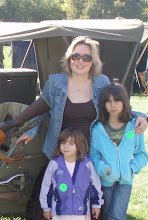This was supposed to be fun and it was not fun. False advertising!! Ok, I did get an account and log in, hit edit and bracketed my URL and it is on the list of favorite blogs! Woo-hoo. Big downer is that the link is not active and the link widget doesn't work correctly. (And I know how to use them!!) Frustrating.
But looking at the bright side of things, I learned one new thing and found one cool thing. I learned that this symbol "|" is called a "pipe." I'm not sure I ever noticed it on my keyboard before! (and I still don't really know what it is used for . . .) I also found the awesome blog One Minute Writer in the list of favorite blogs. It is a site with a sixty second timer and a writing prompt for each day. The idea is to write for one minute on the day's topic. Awesome!
So after that little adventure with PBWiki, I've decided that this is how I prefer my PB:

Or since this exercise was called a "sandbox" (as in "let's play around and have fun"), the experience could also be put this way:
As advertised:
As experienced:




